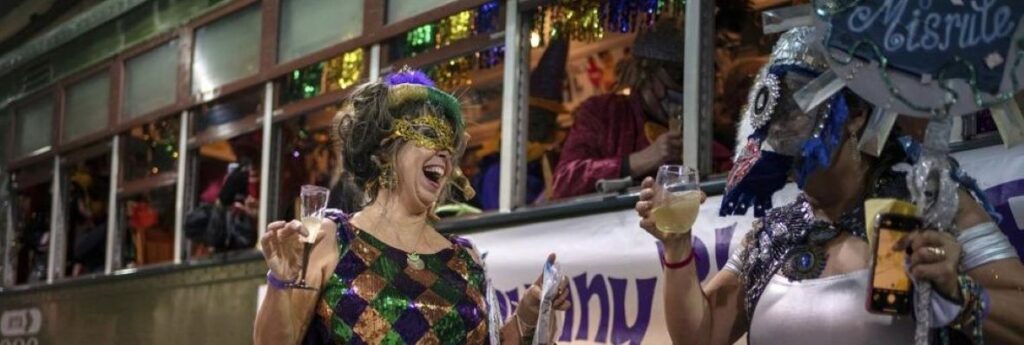Vaccinated, masked and ready-to-revel New Orleans residents began ushering in Carnival season late last week with a rolling party on the city’s historic streetcar line, an annual march honouring Joan of Arc in the French Quarter, and a collective, wary eye on coronavirus statistics.
Carnival officially begins each year on Jan. 6 – the 12th day after Christmas – and, usually, comes to a raucous climax on Mardi Gras, or Fat Tuesday, which falls on March 1 this year. Last Thursday’s festivities came two years after a successful Mardi Gras became what officials later realized was an early Southern super-spreader of COVID-19; and nearly a year after city officials cancelled 2021 parades.
This year, the party is going on despite rapidly rising COVID-19 cases driven by the omicron variant.
“Without a doubt, we will have Mardi Gras 2022,” Mayor LaToya Cantrell said during a Thursday morning kickoff event, where participants removed protective masks long enough to sample slices of king cake, a seasonal delicacy.
“Having a Mardi Gras, and a successful and healthy Mardi Gras, is as important to this region’s mental health as it is important to the economic health of this city,” added James Reiss, an official with the Rex Organization, a 150-year-old Carnival group.
Still, in a season known for excess, the virus prompted restraint. At Bywater Bakery, owner Chaya Conrad usually has a day-long block party with live music to mark the beginning of Carnival season. After a “virtual” recorded concert last year, she had planned to return to the big block party this time around. But after the virus sickened many of her employees over Christmas, she cancelled the extravaganza. Instead, a piano player on a flatbed truck played as customers snapped up king cakes.
“I don’t need the musicians getting sick. I don’t need my customers getting sick and I don’t need my other half of my staff getting sick,” Conrad said. “When this dies down then we’ll have the big block party.”
In what has become a traditional kickoff to the season, a group known as the Phunny Phorty Phellows boarded one of the historic St. Charles line streetcars with a small brass band. Vaccinations and protective masks were required and seating on the streetcar was limited.
Larger, more opulent parades will follow in February as Mardi Gras nears.
“It was certainly the right thing to do to cancel last year,” said Dr. Susan Hassig, a Tulane University epidemiologist who also is a member of the Krewe of Muses and rides each year on a huge float in the Muses parade. “We didn’t have vaccines. There was raging and very serious illness all over the place.”
Now, she notes, the vaccination rate is high in New Orleans, where 81% of all adults are fully vaccinated, according to the city’s statistics.
And while people from outside the city are a big part of Mardi Gras crowds, Cantrell’s anti-virus measures include proof of vaccination or a negative test for most venues.
Sharing Hassig’s cautious optimism is Elroy James, president of the Zulu Social Aid and Pleasure Club, a predominantly Black organization whose Mardi Gras morning parade is a highlight of Carnival. Early in the pandemic, COVID-19 was blamed for the death of at least 17 of Zulu’s members.
“I think most krewes, particularly, I know, for Zulu, we’ve been very proactive, leaning in, with respect to all of the safety protocols that have been in place since the onset of this thing,” James said. “Our float captains are confirming our riders are vaccinated. And part of the look for the 2022 Mardi Gras season is face masks.”
Asked whether Carnival krewes should be making contingency plans for their balls in case of future restrictions, Gov. John Bel Edwards said he is not currently planning restrictions on gatherings. But he added that people should be careful about spending time amid large groups of unmasked people.
“Does that apply to a Mardi Gras ball? I think its pretty self-evident that it does,” Edwards said.
Hassig says she won’t attend indoor gatherings. She, is, however, determined to ride in the Feb. 24 parade – vaccinated, wearing an N95 mask and knowing that outdoor activities are safer.
Hassig rode in her first parade in 2006 as the city struggled to recover from Hurricane Katrina. Now, she wants to participate in the recovery from the economic ravages of the virus. “It’s incredibly important, financially, for the city that this goes well,” she said.

